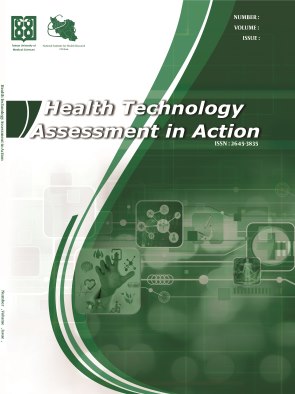Bibliometric Analysis of Artificial Intelligence Revolutions in Health-related Sustainable Development Goals
Abstract
Background: In line with the advancement of Artificial Intelligence (AI), innovative solutions have been designed to improve healthrelated Sustainable Development Goals (SDGs). Accordingly, there is an increasing trend in the realm of AI and SDG research areas.
Objectives: This study aimed to analyze the trends and patterns of AI research in health-related SDGs using bibliometric analysis.
Methods: The bibliometric approach facilitated the identification of key terms and countries from previous research. We used VOSviewer to map and analyze data obtained from three databases: Scopus, Web of Science, and PubMed.
Results: Our findings illustrated that research on health has been a popular area of study in recent years. In particular, we observed a significant increase in research on AI in health-related SDGs during 2015 - 2022.
Conclusions: This study provides insights into the trends and patterns of AI research in health-related SDGs using bibliometric analysis. The findings can guide future research by identifying key terms that require further investigation.
2. Goralski MA, Tan TK. Artificial intelligence and sustainable development. The International Journal of Management Education. 2020;18(1):100330.
3. Wahl B, Cossy-Gantner A, Germann S, Schwalbe NR. Artificial intelligence (AI) and global health: how can AI contribute to health in resource-poor settings? BMJ global health. 2018;3(4):e000798.
4. Di Vaio A, Palladino R, Hassan R, Escobar O. Artificial intelligence and business models in the sustainable development goals perspective: A systematic literature review. Journal of Business Research. 2020;121:283-314.
5. Truby J. Governing artificial intelligence to benefit the UN sustainable development goals. Sustainable Development. 2020;28(4):946-59.
6. Goh H-H, Vinuesa R. Regulating artificial-intelligence applications to achieve the sustainable development goals. Discover Sustainability. 2021;2:1-6.
7. Sirmaçek B, Gupta S, Mallor F, Azizpour H, Ban Y, Eivazi H, et al. The potential of artificial intelligence for achieving healthy and sustainable societies. arXiv preprint arXiv:220207424. 2022.
8. Schwalbe N, Wahl B. Artificial intelligence and the future of global health. The Lancet. 2020;395(10236):1579-86.
9. Panda PS, Bhatia V. Role of artificial intelligence (AI) in public health. Indian Journal of Community and Family Medicine. 2018;4(2):60.
10. Van Eck NJ, Waltman L. VOSviewer manual. Manual for VOSviewer version. 2011;1(0).
11. Van Eck N, Waltman L. Software survey: VOSviewer, a computer program for bibliometric mapping. scientometrics. 2010;84(2):523-38.
12. Van Eck NJ, Waltman L. Text mining and visualization using VOSviewer. arXiv preprint arXiv:11092058. 2011.
13. Van Eck N, Waltman L, Noyons E, Buter R. Automatic term identification for bibliometric mapping. Scientometrics. 2010;82(3):581-96.
14. Murray CJ. Choosing indicators for the health-related SDG targets. The Lancet. 2015;386(10001):1314-7.
15. Lim SS, Allen K, Bhutta ZA, Dandona L, Forouzanfar MH, Fullman N, et al. Measuring the health-related Sustainable Development Goals in 188 countries: a baseline analysis from the Global Burden of Disease Study 2015. The Lancet. 2016;388(10053):1813-50.
16. Fullman N, Barber RM, Abajobir AA, Abate KH, Abbafati C, Abbas KM, et al. Measuring progress and projecting attainment on the basis of past trends of the health-related Sustainable Development Goals in 188 countries: an analysis from the Global Burden of Disease Study 2016. The Lancet. 2017;390(10100):1423-59.
17. Hannan M, Al-Shetwi AQ, Ker PJ, Begum R, Mansor M, Rahman S, et al. Impact of renewable energy utilization and artificial intelligence in achieving sustainable development goals. Energy Reports. 2021;7:5359-73.
18. Tagde P, Tagde S, Bhattacharya T, Tagde P, Chopra H, Akter R, et al. Blockchain and artificial intelligence technology in e-Health. Environmental Science and Pollution Research. 2021;28:52810-31.
19. Owoyemi A, Owoyemi J, Osiyemi A, Boyd A. Artificial intelligence for healthcare in Africa. Frontiers in Digital Health. 2020;2:6.
20. Yeh S-C, Wu A-W, Yu H-C, Wu HC, Kuo Y-P, Chen P-X. Public perception of artificial intelligence and its connections to the sustainable development goals. Sustainability. 2021;13(16):9165.
21. Mhlanga D. Artificial intelligence in the industry 4.0, and its impact on poverty, innovation, infrastructure development, and the sustainable development goals: Lessons from emerging economies? Sustainability. 2021;13(11):5788.
22. Kamruzzaman M. Impact of social media on geopolitics and economic growth: Mitigating the risks by developing artificial intelligence and cognitive computing tools. Computational Intelligence and Neuroscience. 2022;2022.
23. Helbing D, Balietti S. From social data mining to forecasting socio-economic crises. The European Physical Journal Special Topics. 2011;195:3-68.
| Files | ||
| Issue | Vol 7, No 4 (2023) | |
| Section | Review Article | |
| DOI | https://doi.org/10.18502/htaa.v7i4.14654 | |
| Keywords | ||
| Artificial Intelligence Revolutions Health Sustainable Development Goals | ||
| Rights and permissions | |

|
This work is licensed under a Creative Commons Attribution-NonCommercial 4.0 International License. |




